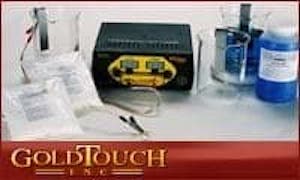
Home of the world famous 'finishing.com HOTLINE' since 1989
-----
Electro-etching solutions for pewter
We are a small firm in the UK who make craft objects in pewter. One of the problems that we have is surface decoration, this is usually incised in to the surface but can only be done in large quantities as it requires expensive tooling. However there is a process that can be used that is comparatively inexpensive that is Electro-etching where the pewter object is covered with a photographic resist with the design in it. The object is then immersed in a solution of salts and connected to the positive pole of a DC supply. The negative lead is connected to a stainless steel plate also immersed on the solution. Without going into too much detail there are other methods of doing this using a carbon block wrapped in felt soaked in a conducting solution. However one thing that prevents us using this method is the composition of the electrolyte. Does this need to have tin in solution, or can it just be a solution of salts. If so what are the salts.
John Corkett- Cardiff, South Wales, UK
Your description of an alternative process sounds remarkably like the same concept as "brush plating" or "tampon plating". I know that the technology has been used to electropolish some metals, mainly stainless steel, so I am not surprised it has been mentioned as an alternative to you. Electrolytes in brush plating tend to be more concentrated than their conventional electroplating brothers because of the higher current densities available in the technique. There is also some question about the viability of some additives, which may not work in brush plating whilst they do in conventional electrolytic plating. This is probably due to the variations in the surface films generated by the two processes. To solve your problem, I would suggest you talk to a brush plating supply house.

Trevor Crichton
R&D practical scientist
Chesham, Bucks, UK
Ed. Note: Please see our finishing.com directories for brush plating equipment, supplies, and shops who perform this service
adv.
Brush plating equipment, chemicals, and supplies from Gold Touch

No dead threads!
Your Q, A, or Comment puts this thread on The Finishing.com HOTLINE.